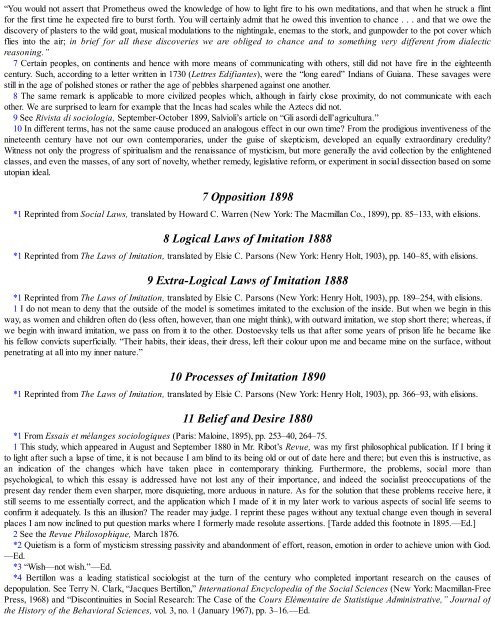3658925934
Create successful ePaper yourself
Turn your PDF publications into a flip-book with our unique Google optimized e-Paper software.
“You would not assert that Prometheus owed the knowledge of how to light fire to his own meditations, and that when he struck a flint<br />
for the first time he expected fire to burst forth. You will certainly admit that he owed this invention to chance . . . and that we owe the<br />
discovery of plasters to the wild goat, musical modulations to the nightingale, enemas to the stork, and gunpowder to the pot cover which<br />
flies into the air; in brief for all these discoveries we are obliged to chance and to something very different from dialectic<br />
reasoning.”<br />
7 Certain peoples, on continents and hence with more means of communicating with others, still did not have fire in the eighteenth<br />
century. Such, according to a letter written in 1730 (Lettres Edifiantes), were the “long eared” Indians of Guiana. These savages were<br />
still in the age of polished stones or rather the age of pebbles sharpened against one another.<br />
8 The same remark is applicable to more civilized peoples which, although in fairly close proximity, do not communicate with each<br />
other. We are surprised to learn for example that the Incas had scales while the Aztecs did not.<br />
9 See Rivista di sociologia, September-October 1899, Salvioli’s article on “Gli asordi dell’agricultura.”<br />
10 In different terms, has not the same cause produced an analogous effect in our own time? From the prodigious inventiveness of the<br />
nineteenth century have not our own contemporaries, under the guise of skepticism, developed an equally extraordinary credulity?<br />
Witness not only the progress of spiritualism and the renaissance of mysticism, but more generally the avid collection by the enlightened<br />
classes, and even the masses, of any sort of novelty, whether remedy, legislative reform, or experiment in social dissection based on some<br />
utopian ideal.<br />
7 Opposition 1898<br />
*1 Reprinted from Social Laws, translated by Howard C. Warren (New York: The Macmillan Co., 1899), pp. 85–133, with elisions.<br />
8 Logical Laws of Imitation 1888<br />
*1 Reprinted from The Laws of Imitation, translated by Elsie C. Parsons (New York: Henry Holt, 1903), pp. 140–85, with elisions.<br />
9 Extra-Logical Laws of Imitation 1888<br />
*1 Reprinted from The Laws of Imitation, translated by Elsie C. Parsons (New York: Henry Holt, 1903), pp. 189–254, with elisions.<br />
1 I do not mean to deny that the outside of the model is sometimes imitated to the exclusion of the inside. But when we begin in this<br />
way, as women and children often do (less often, however, than one might think), with outward imitation, we stop short there; whereas, if<br />
we begin with inward imitation, we pass on from it to the other. Dostoevsky tells us that after some years of prison life he became like<br />
his fellow convicts superficially. “Their habits, their ideas, their dress, left their colour upon me and became mine on the surface, without<br />
penetrating at all into my inner nature.”<br />
10 Processes of Imitation 1890<br />
*1 Reprinted from The Laws of Imitation, translated by Elsie C. Parsons (New York: Henry Holt, 1903), pp. 366–93, with elisions.<br />
11 Belief and Desire 1880<br />
*1 From Essais et mélanges sociologiques (Paris: Maloine, 1895), pp. 253–40, 264–75.<br />
1 This study, which appeared in August and September 1880 in Mr. Ribot’s Revue, was my first philosophical publication. If I bring it<br />
to light after such a lapse of time, it is not because I am blind to its being old or out of date here and there; but even this is instructive, as<br />
an indication of the changes which have taken place in contemporary thinking. Furthermore, the problems, social more than<br />
psychological, to which this essay is addressed have not lost any of their importance, and indeed the socialist preoccupations of the<br />
present day render them even sharper, more disquieting, more arduous in nature. As for the solution that these problems receive here, it<br />
still seems to me essentially correct, and the application which I made of it in my later work to various aspects of social life seems to<br />
confirm it adequately. Is this an illusion? The reader may judge. I reprint these pages without any textual change even though in several<br />
places I am now inclined to put question marks where I formerly made resolute assertions. [Tarde added this footnote in 1895.—Ed.]<br />
2 See the Revue Philosophique, March 1876.<br />
*2 Quietism is a form of mysticism stressing passivity and abandonment of effort, reason, emotion in order to achieve union with God.<br />
—Ed.<br />
*3 “Wish—not wish.”—Ed.<br />
*4 Bertillon was a leading statistical sociologist at the turn of the century who completed important research on the causes of<br />
depopulation. See Terry N. Clark, “Jacques Bertillon,” International Encyclopedia of the Social Sciences (New York: Macmillan-Free<br />
Press, 1968) and “Discontinuities in Social Research: The Case of the Cours Elémentaire de Statistique Administrative,” Journal of<br />
the History of the Behavioral Sciences, vol. 3, no. 1 (January 1967), pp. 3–16.—Ed.









![Genki - An Integrated Course in Elementary Japanese II [Second Edition] (2011), WITH PDF BOOKMARKS!](https://img.yumpu.com/58322134/1/180x260/genki-an-integrated-course-in-elementary-japanese-ii-second-edition-2011-with-pdf-bookmarks.jpg?quality=85)
![Genki - An Integrated Course in Elementary Japanese I [Second Edition] (2011), WITH PDF BOOKMARKS!](https://img.yumpu.com/58322120/1/182x260/genki-an-integrated-course-in-elementary-japanese-i-second-edition-2011-with-pdf-bookmarks.jpg?quality=85)





